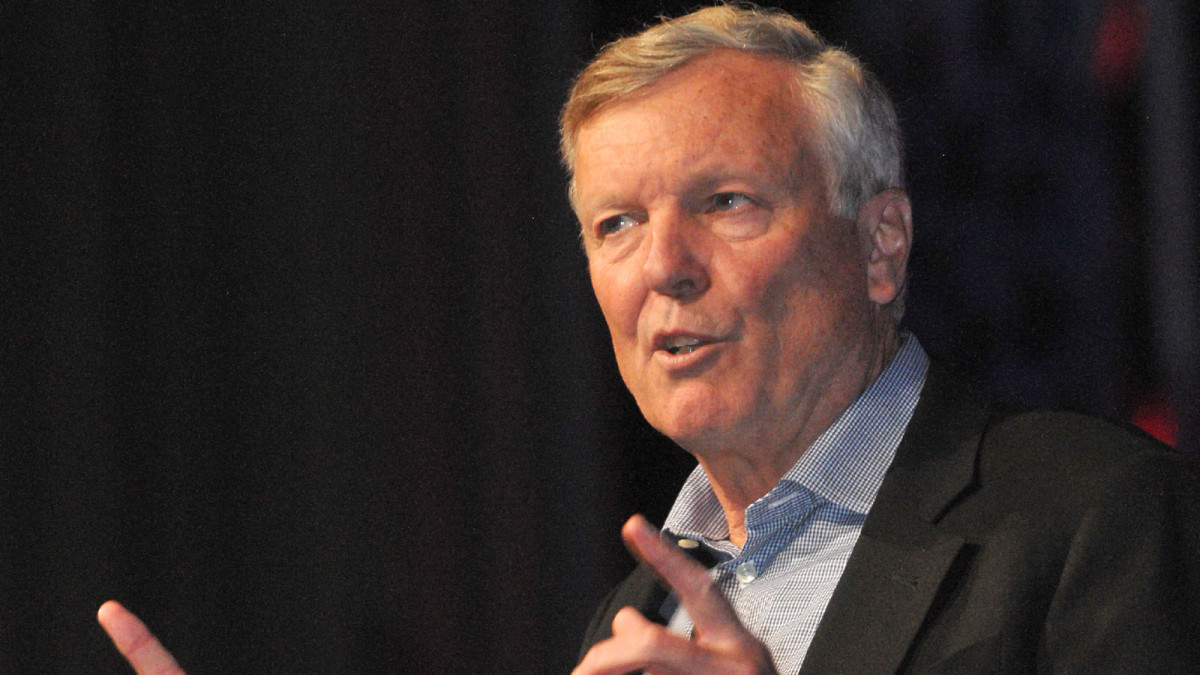Charter's Rutledge Says Cable Mobile Service Pricing Could Drop Further
Charter chief compares current mobile market to wireline business 15 years ago

The smarter way to stay on top of the multichannel video marketplace. Sign up below.
You are now subscribed
Your newsletter sign-up was successful
Just weeks after Charter Communications slashed prices for its Spectrum Mobile offering to $29.99 per month, chairman and CEO Tom Rutledge said charges for wireless cable offerings could drop further as the cost to provide service continues to decline.
“I think the mobile opportunity is very similar to the wireline opportunity that existed 15 years ago,” Rutledge said at the virtual/in-person Liberty Media Investor Day in New York. “Look at what happened there — we had a high-priced wireline phone service — in the metro area here, it was about $72 a month. That product now is less than $15 a month. And the biggest wireline phone companies in America are Comcast and Charter. So, I think the opportunity in mobile is similar. It’s got its own complexities, but the opportunity is there to create value for consumers. Consumers actually save money and we make money. That’s a pretty attractive business model that is available to us. And yeah, I think it leads toward convergence.”
Charter introduced its $29.99 price point — for a minimum of two lines each — in October, a big discount from its previous charge of $45 per month, per line. That price reduction came on the heels of Comcast introducing a $30 per line service (for a minimum of four lines) which took effect in April.
In a research note, Bernstein media analyst Peter Supino wrote that Rutledge’s comments provided “a muscular reminder of Charter’s ambitions and competitive advantages.”
“Charter will sell wireless as aggressively as necessary to ensure that it achieves growth of customers and EBITDA per customer,” Supino added.
Also: Analyst Says It’s Time to Take Cable Wireless Seriously
Liberty Media chairman John Malone said that while convergence of fixed and wireless assets is common in Europe, where Liberty, a major Charter shareholder, has substantial holdings, it hasn’t yet taken hold in the U.S. While European companies have made bigger strides in deploying fiber networks compared to their U.S. counterparts, Malone stressed that every company and every market is different.
The smarter way to stay on top of the multichannel video marketplace. Sign up below.
“I’d start by reminding everybody that Europe is largely converged, the broadband companies are also wireless companies,” Malone said at the Investor Day. “That’s been true in every market we’re still operating in. In terms of technology, existing network structure, the nature of technological upgrade, the pressure from competition, etc. Every market is different.”
Malone added that in the U.K. for example, Liberty overbuilt itself with fiber, initially to capture more B2B business and because it was relatively cheap to build. The U.K., he said, also is relatively underbuilt — there isn’t a lot of fiber capacity and areas will be built out as opportunities present themselves. In the U.S., Malone said the biggest area for growth could be in boosting upstream capacity.
“That may be more of a political reality than a business reality in the near term,” Malone said. “And the cable industry contemplated that, and does have the capability of vastly expanding the upstream capacity.”
Malone said outside of the U.S., there has been a movement toward collectively building networks.
“In some places there is only one fiber backbone network that will be built and everyone will share and use it. So the models vary and in each location it depends on capital efficiency, the current state of play, cooperation between multiple players. It’s not uncommon. For instance in the U.K. there are four meaningful cell phone providers but only two networks, and those four competitors share those two 2 nets as a matter of capital efficiency.”
Liberty CEO Greg Maffei added that the path U.S. cable companies have taken by upgrading using DOCSIS and other technologies to boost capacity and efficiency gives them some leeway before having to decide whether to go deeper into fiber expansion.
“It’s a long ride for U.S. cable,” Maffei said. ■
Mike Farrell is senior content producer, finance for Multichannel News/B+C, covering finance, operations and M&A at cable operators and networks across the industry. He joined Multichannel News in September 1998 and has written about major deals and top players in the business ever since. He also writes the On The Money blog, offering deeper dives into a wide variety of topics including, retransmission consent, regional sports networks,and streaming video. In 2015 he won the Jesse H. Neal Award for Best Profile, an in-depth look at the Syfy Network’s Sharknado franchise and its impact on the industry.

